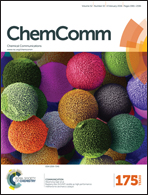Target-selective photo-degradation of AFP-L3 and selective photo-cytotoxicity against HuH-7 hepatocarcinoma cells using an anthraquinone–PhoSL hybrid†
Abstract
A purposefully-designed anthraquinone–Pholiota squarrosa lectin (PhoSL) hybrid effectively degraded α-fetoprotein-L3 (AFP-L3) associated with liver cancer. Degradation was achieved under light irradiation in the absence of any additives and under neutral pH conditions. Moreover, the hybrid effectively exhibited selective photo-cytotoxicity against HuH-7 hepatocarcinoma cells upon photo-irradiation.


 Please wait while we load your content...
Please wait while we load your content...